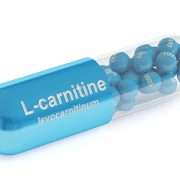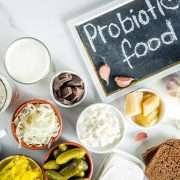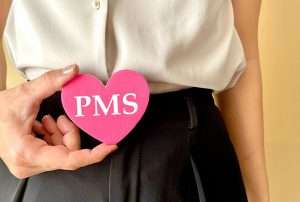Some amazing top tips to Manage your severe PMS symptoms to reduce period pain
Signs & Severe PMS Symptoms
Premenstrual syndrome, known as PMS, is the term used to describe the psychological and physiological symptoms that several women suffer before their period (menstruation). Symptoms subside during a female’s menstruation, but before they reappear, there is often at most one week without any severe PMS symptoms. Premenstrual symptoms are believed to affect up to 75% of females who have periods and can range from mild to severe (in 20 to 30 percent of females). PMS is associated with a lower level of well-being for 8% of women who have severe PMS symptoms.
PMS is a complicated disorder with both psychological and physical symptoms. Research findings indicate:
Throughout their menstrual periods, progesterone and oestrogen, the body’s very own cyclic hormones, cause hypersensitivity in women suffering from PMS. Serotonin plus gamma-butyric acid, two neurotransmitters, are important brain molecules playing vital roles. PMS symptoms don’t appear following menopause or even during pregnancy. Even though there is no known cause for PMS, you can treat it with medicine and other methods.
PMS symptoms are very troublesome and annoying but their intensity can be managed. It is a pressing concern for many females as premenstrual syndrome takes a major toll on their daily lives. Hence, there is a lot of conversation about PMS relief products. The PMS Gummies from Plix are a fun way to combat your PMS symptoms. These delicious gummies made from natural ingredients such as Chaste berry & Ginseng extracts are very beneficial for easing out cramping and controlling your mood swings. They are also known to reduce acne, one of the major before period symptoms, and help you not feel tired like before.
What Exactly Are Severe PMS Symptoms?
Whereas PMS frequently has normal to moderate signs and symptoms which have little to zero influence on day-to-day pursuits, symptoms can sometimes be severe enough to provide an adverse effect on your regular activities and general overall wellness. You will constantly suffer from PMS symptoms just until every period if you do have it. Even though you may just encounter a few of the symptoms listed here, PMS frequently has at minimum a few distinct sensations.
Premenstrual dysphoric disorder (PMDD) is a much more severe dysfunction that affects almost 3 to 8% of menstruation women. Another week or two before their menstruation, these females experience severe depression. Profound depression and excessive irritability are the primary symptoms of PMDD. PMS is mild & typically includes both emotional and physical menstruation symptoms. Females who have had postpartum depression or have a family history of depression appear to be more susceptible to the premenstrual dysphoric disorder.
Mild & Severe PMS SymptomsSome typical symptoms include:
Some typical symptoms include:
- Headache or migraines
- Pain in the joints, lower back
- Epic hunger pangs & mood swings
- Difficulty focusing or concentrating on things
- Annoying bloating
- Gaining a lot of weight
Some severe PMS symptoms such as:
- Great feelings of sorrow
- Angry outbursts, sobbing spells, and melancholy
- persistent irritation and fury, possibly with recurrent outbursts towards the closer people like family & friends
- Feeling like things are out of your control or being completely overwhelmed with things
- Anxiety and Panic attacks
- Very low energy and overeating
- Feeling disinterested in your daily life
- Some folks also experience suicidal thoughts
Diagnosing PMS
Premenstrual syndrome cannot be definitively diagnosed with certain physical assessments or laboratory tests. If a certain condition is an aspect of your regular premenstrual cycle, your physician might diagnose PMS.
Your physician might request that you keep a journal or a record of your premenstrual symptoms and signs for at least one or two monthly cycles to create a premenstrual rhythm. Both the date they begin and the date they stop recurring should be noted. Note the beginning and ending days of your menstruation as well.
Prolonged fatigue, thyroid issues, and mood disturbances like despair and anxiousness are a few illnesses that might duplicate PMS. To help make an accurate evaluation, your doctor may request further tests like a thyroid screening check or a mood diagnostic test.
Exercising To Relieve PMS Symptoms
This is not necessary to be a rigorous gym session. Every day, going for a simple 30-minute stroll across your neighborhood will improve and boost your morale to get through the day. You could try some of these options below.
Aerobics
Exercise, especially aerobics, can greatly reduce PMS symptoms including exhaustion and melancholy. Your mental, physical and psychological health will benefit greatly from 3 60-minute aerobic sessions per week.
Yoga
Yoga has several advantages outside just alleviating PMS symptoms. You can enhance your heart and circulatory health, lose weight, recover flexibility, maintain a well-balanced metabolism, and more by starting a daily Yoga regimen. In addition, yoga is highly regarded for easing chronic back pain, including headaches, pain in the lower back, osteoarthritis, and more.
Walking or Running
Swimming is a fantastic option, as are walking and jogging. They aid in reducing changes in mood by increasing endorphins, vital brain chemicals. Elevated endorphin levels also lessen PMS-related pain.
Managing Severe PMS Symptoms
Hormonal imbalances set off the symptoms associated with PMS, yet nobody understands what triggers it. There isn’t one PMS remedy that succeeds for everybody. You could take counter medications that can aid with these problems. Let’s take a look at how you could manage these symptoms better.
Managing your stress levels. Although it can be challenging, try to keep an eye on your primary stressors. This could involve asking a colleague for assistance, learning a relaxing exercise like meditation or yoga, or acquiring a reliable daily planner.
Tolerance in indulgence. Try to limit your intake of salty foods and desserts. Minimizing the amount of alcohol and caffeinated beverages you consume may also provide some ease.
Food to suit one’s moods. Choose meals that are high in complex carbs and lean protein. Consider some whole grains and nuts. Certain foods can raise your tryptophan concentrations, which your body uses to generate serotonin. Keep in mind that levels of serotonin can fall as a result of hormonal fluctuations.
Taking natural supplements. Plix’s PMS Gummies are a fun and healthy way to manage and effectively reduce pain, cramping, and irritability to get those unexpected mood swings in control. These gummies comprising natural components like Ginseng, Chaste berries, and key elements like Magnesium, Vitamin B6 work in harmony to relieve you of your disruptive PMS symptoms.
FAQs
1. Why am I so irritable before my period?
It is believed that hormonal fluctuations related to the menstrual cycle (variations in oestrogen and progesterone concentrations) alter women’s moods and cause unpleasant emotions like irritation and rage.
2. Why do my PMS symptoms seem to be deteriorating with age?
Hormone fluctuations may be to blame for increasing PMS symptoms if you’re close to menopause. According to studies, women who experience PMS at an early age typically experience a more difficult changeover to menopause later on in life. Each month, PMS symptoms may worsen due to these hormonal fluctuations.
3. What is the Function of these PMS Supplements?
Premenstrual syndrome (PMS) problems like cramping, acne breakouts, irritation, tension, changes in mood, and more can all be treated with the use of natural materials and herbs like Ginseng, Chaste Berry, Vitamin B6, and Magnesium.
4. For how long Can You Take a PMS Supplement?
To prevent PMS and improve your general health, we advise including it in your regular diet and consuming it daily.
5. Are there any adverse effects caused by these supplements post-consumption?
We exclusively incorporate natural ingredients in our gummies, such as ginseng, chaste berries, vitamin B6, and magnesium, which have been shown to have significant anti-PMS effects. Therefore, it is important to first see your specialist about any allergies or health problems before consuming.
6. What time of day should PMS gummies be taken?
Two gummies should be taken daily, and they can be eaten at any time. There’s no need to include or mix it with any additional food or water during consumption















